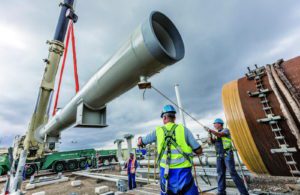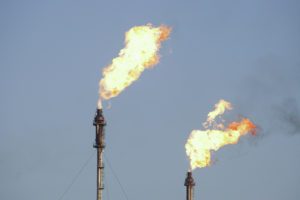
Ukraine in 2019 increased transit of natural gas through its gas transmission system (GTS) by 3.2% (by 2.807 billion cubic meters) compared to 2018, to 89.586 billion cubic meters, according to recent data from JSC Ukrtransgaz.
According to the calculations of the Interfax-Ukraine agency, in particular gas transit through the country to Europe last year amounted to 86.696 billion cubic meters (3.4% more from 2018), to Moldova some 2.890 billion cubic meters (1.7% less).
In December 2019, gas transit increased by 6.3% (by 479.8 million cubic meters) compared to the same month of 2018, to 8.092 billion cubic meters. In particular, gas transit through Ukraine to Europe amounted to 7.736 billion cubic meters (up by 7%), Moldova some 356.1 million cubic meters (7.2% less).

The Biosphere Corporation, a leading manufacturer and distributor of household and hygienic products in Ukraine and the CIS, has started accepting a line for production of diapers in Italy and plans to start their production in Ukraine early 2020, the founder and CEO of the corporation Andriy Zdesenko has said.
“We plan to become number one manufacturer of private brands of diapers in Ukraine and several of our private labels,” he told Interfax-Ukraine on December 28.
Zdesenko said that on December 18-19 the first stage of equipment acceptance took place, and its final acceptance will be in Italy on January 13-17, after which the equipment will be installed at the production site in Dnipro.
Commenting on the unsuccessful attempts in the past of other domestic entrepreneurs to arrange the production of diapers in Ukraine, the founder of Biosphere noted the complexity of production technology and high competition in the market.
“But now there is confidence that we have gained enough expertise and brand recognition for the Biosphere. We also invited a specialist from Canada to lead this production, so we are ready to seriously compete with Western brands,” Zdesenko said.
The Biosphere Corporation has been operating in Ukraine for over 20 years. Its products are presented in about 20 markets in Europe and Asia. The product portfolio includes more than 2,000 items.

Latschbacher Group, together with Austrian partners, offers ground-based laser scanning technology for forest inventory in Ukraine, as well as studies based on simulation of forest growth, Volodymyr Molochko, a specialist in accounting harvested forest and solutions for tracking forest supply chains at Timber & Equipment GmbH from Latschbacher Group, has reported.
“We prepared calculations of the project. We’ve performed various calculations that will help soberly evaluate different ways of conducting an inventory. According to our estimates, the cost of implementing the national forest inventory in Ukraine using modern methods with laser technology will be about EUR 10 million,” he said in an interview with the Interfax-Ukraine agency.
Gunther Bronner, a specialist in accounting technologies for growing forests at Umweltdata GmbH, explained that traditionally the national forest inventory is carried out using standard methods based on laying sampling points and creating special teams.
According to data from Austrian experts, Ukraine plans to carry out the national forest inventory using standard methods, which will take five years and substantially more funds. In particular, they noted it is necessary to lay more than 16,000 sample points across the entire forest area in Ukraine, process 400 points a month, which will require at least nine teams of two people each.
“If to look at the costs spent on conducting the national forest inventory, the time and effort spent on it, and compare the benefits actually gained from this with the capabilities of laser scanning from an airplane, there will be no other alternative but to get into a deep depression,” Molochko believes.
According to Bronner, several countries, in particular Austria and Ireland, use an alternative method of laser scanning, and the experience of Austria with mixed forests and mountainous terrain similar to those in Ukraine would be very useful for Ukraine. He added that new laser technologies allow to significantly expand knowledge about the growing forest, the boundaries of forest areas, the topography, species and assortment composition, get a comprehensive model of crown heights, as well as identify forest areas infected by the beetle and plan its harvesting, build forest roads and get the maximum economic effect.
“A thorough mapping of forest resources will open the way to a quality forest management system. We estimate losses from inefficient forest management in Ukraine at tens of millions of euros per year, and these are optimistic figures,” Molochko said.
He specified that the forest area in Ukraine is approximately 10.4 million hectares, which is comparable to Poland, where the forest area is about 9.2 million hectares or Germany, which has 10.7 million hectares of forests. However, legal timber harvesting in Ukraine is about 20 million cubic meters per year, while in Poland and Germany the figure is about 40 million cubic meters and 64 million cubic meters respectively.

Natural gas production in Ukraine fell 0.8% year-on-year in January-November 2019, to 18.916 billion cubic meters (bcm), the Energy and Environment Protection Ministry has told Interfax-Ukraine.
Naftogaz group enterprises lowered gas output by 2.2%, to 14.722 bcm: Ukrgazvydobuvannia produced 13.653 bcm of gas, down 2.9%, Ukrnafta produced 1.062 bcm, up 8.1%, and Chornomornaftogaz produced 6.5 million cubic meters (mcm), down 10.3%.
Other producers boosted gas output by 4.4%, to 4.194 bcm in the 11 months. The biggest of them were Naftogazvydobuvannia with 1.509 bcm, Ukrnaftoburinnia with 670.03 mcm, and ESKO-Pivnich, which produced 486.59 mcm.

The Health Ministry of Ukraine has paid for transplant surgeries that will be held in 2020, reads a statement on the ministry’s website.
According to the statement, the ministry transferred the payments to ten participants of the pilot project for organ transplantation whose applications were approved by the Cabinet of Ministers of Ukraine on December 18, 2019.
The money was allocated from the national budget for 2019. As soon as the first tranche is spent, another one will be transferred from the national budget for 2020.
As reported, the Cabinet of Ministers extended the pilot project for organ transplantation for 2020.
All medical institutions that have a license to provide organ transplantation services were included in the list of participants in the pilot project.
In addition, the government approved the tariffs for transplantation of organs and other anatomic materials: kidney allotransplantation (from living or deceased donor) will cost UAH 323,798; ABO incompatible kidney allotransplantation – UAH 721,230; heart or heart-lung transplant – UAH 535,280; full-size or partial liver transplant – UAH 855,039; donor nephrectomy – UAH 33,561; donor liver resection – UAH 116,130; organ recovery from deceased donor – UAH 74,086; donor tissue matching (antigen testing via the polymerase chain reaction (PCR) method) – UAH 18,630; allogeneic hematopoietic stem cell transplant, including cell recovery stage – UAH 1.36 million; autologous hematopoietic stem cell transplant, including cell recovery stage – UAH 1.308 million.
The government also allowed using the funds to pay for hematopoietic stem cell transplant from abroad, as well as making prepayments for transplant services and use the funds remaining from 2019 in 2020.

JSC Ukrzaliznytsia jointly with the Infrastructure Ministry of Ukraine have signed a memorandum of intent with General Electric Transportation (the United States) on the acquisition of 40 more locomotives made by the U.S. company.
“We agreed on the next phase of the acquisition of 40 GE locomotives. We plan that we will receive the first of them in 2020,” Head of Ukrzaliznytsia Yevhen Kravtsov wrote on his Facebook page on Monday.
According to Kravtsov, the new rolling stock will significantly improve the operation of the diesel locomotive traction and the overall operations of the company.
The head of Ukrzaliznytsia said that the first batch of 30 GE locomotives is already operating successfully and is demonstrating its effectiveness, performing about 20% of all freight work.
“According to our estimates, in 2019, only thanks to GE locomotives, we saved about UAH 100 million on fuel,” Kravtsov said.
According to him, the localization of production for the first GE locomotives should be 15%.